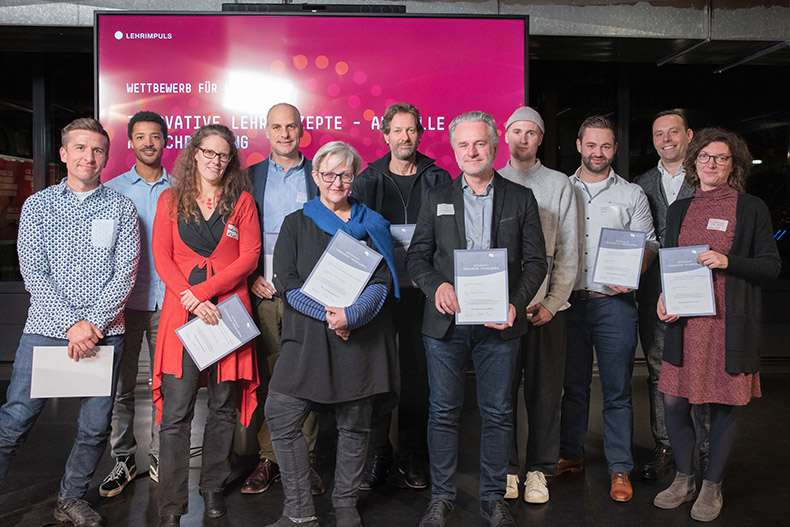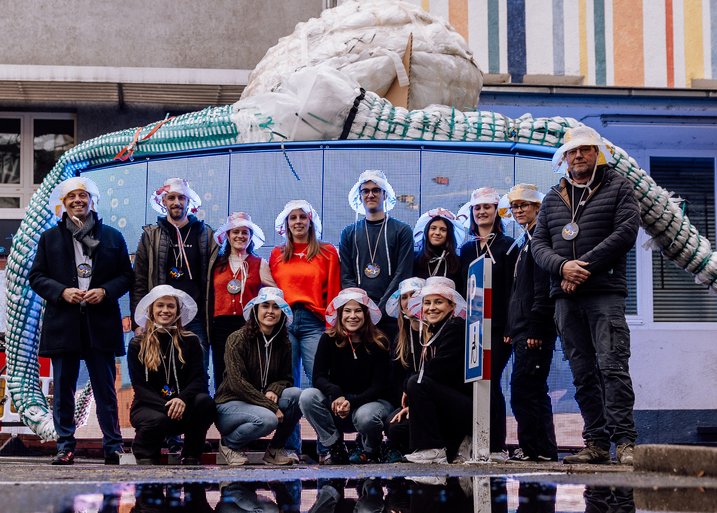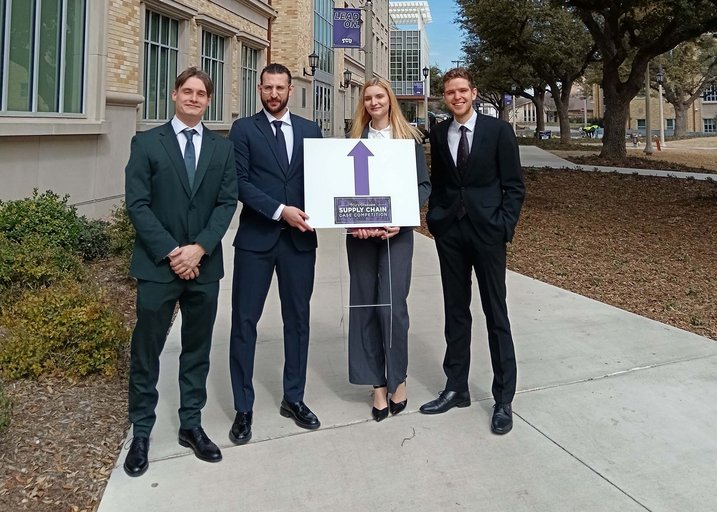Every year, Mainz University of Applied Sciences provides funding to faculty members who break new ground by implementing innovative teaching projects.
A total of 22 entries were submitted this year as part of the funding for innovative teaching. A total of 80,000 Euro was available for funding in 2023. The projects submitted were consistently innovative and sustainable and ranged from ideas using AI technologies and new approaches to analog teaching and learning to experimental visions involving interdisciplinary collaboration.
Chaired by the Vice President for Studies and Teaching, Prof. Kerstin Molter, the panel of judges, which included Prof. Gero Quasten (School of Engineering), Prof. Dr. Jens Reinhardt and Prof. Dr. Isabelle Hillebrandt (both School of Business), Prof. David Scherr (School of Design), Alessandra Reß (Competence Center for Innovation in Studies and Teaching) and students Max Kohlmann, Julia De Filippo, and Johanna Moog, discussed and rated the entries.
These ten projects – presented with the judges’ reviews – will be funded in the coming year:
King Konrad II - Scenographic Project & Augmented Reality
School of Design / Susanne Maier-Staufen
What the panel of judges had to say: The project creates a bridge between the old world and the new by connecting the venerable space of the Old Cathedral with virtual realities. Inspired by the 1000th anniversary of the coronation of Konrad II in 923, students from the Interior Architecture degree program will develop a spatial concept to bring this historically significant event to life for visitors. The spatial installation will be staged using an augmented reality app. Visitors to the cathedral can look forward to a multimedia event, while students will be involved in an exciting interdisciplinary project in terms of space and content.
Digital Gardening – Collaborative Forms of Knowledge Transfer with Wiki Platforms
School of Design / Alexander Roidl (Research and Teaching Professorship for Media Informatics in Communication Design (Tandem-Professur)) and Prof. Monika Aichele
What the panel of judges had to say: In light of the ideal of a culture of sharing and the debates over sustainability, wikis and similar knowledge databases are currently undergoing a renaissance. In the digital garden, one such wiki from the master’s degree program in Communication Design is to be linked to teaching and handed over to the students on a continuous basis. We see the potential here to create a starting point from which knowledge can be democratically collected, organized, and made available to the public.
Sharing Is Caring – Scientific Communication Between Porta Potty, Swimming Pool, and Coffeemaker
School of Design / Prof. Claudia Nass Bauer
What the panel of judges had to say: How do places (of learning) influence us? How can places be transformed and how can design strategies support the design of contextual solutions? Sharing Is Caring aims to approach this question with workshops from the field of scientific communication, swapping the university for unusual learning/teaching locations ranging from waiting rooms to sightseeing boats. An innovative concept that remains true to the school in terms of content, but at the same time questions conventions and actively seeks interaction with the outside world.
Para-More: Parameterized OLAT Tasks – One Exercise Is Transformed into Many
School of Engineering / Prof. Dr.-Ing. Katharina Kluge
What the panel of judges had to say: Generating a large number of variations of this task from a single exercise has advantages for students and teachers alike: Students are given a virtually infinite number of exercises to practice, while at the same time teachers do not have to devise several exercises of the same kind. The project is highly convincing as an innovative teaching, learning, and testing format and promotes a culture of sharing: The knowledge gained and the exercises will be made available to all faculty members at the university as OER materials.
Digital Skilled Trades
School of Engineering / Prof. Thomas Mrokon and Joel Jöbgen
What the panel of judges had to say: This project focuses on linking digital and analog processes as a collaborative system instead of a competitive one. The blending of virtual, digitally developed constructions with implementation in the real world is intended to offer new options, particularly for the non-destructive dismantling and reconstruction of buildings. The possibilities of digital assistance systems are being explored as part of the evolving construction industry. This project shows an innovative path toward possible sustainable construction methods of the future.
INGenious Quizzing: AI-Supported Designing of Quiz Questions Using Prompt Templates
School of Engineering, School of Business / Tom Bender and Florence De Boni
What the panel of judges had to say: The aim of the project is to develop optimized prompt templates designed to generate quiz questions for use in the testing tool of the central learning platform OpenOLAT. With the optimized templates, educators can generate subject-specific quiz and test questions based on AI and have test questions generated in output that can be imported directly into OpenOLAT. The concrete implementation is based on the example of the Building Construction theory module. A long-term scaling of the innovative teaching format to other modules and schools is planned.
HELAU – Designing a float for the Rose Monday Carnival Parade in Mainz 2024
School of Engineering, School of Design, School of Business / Prof. Jürgen Rustler, Prof. Bernd Benninghoff, and Prof. Dr. Bernhard Ostheimer
What the panel of judges had to say: Interdisciplinarity under real-life conditions! The float for the Rose Monday parade brings together and showcases all the disciplines represented at Mainz University of Applied Sciences: conception, design, construction, communication, interaction, and presentation can only be implemented to a high standard and on schedule if all three schools at the university work together. The particular challenge here is the focus on reality. The final result is something to look forward to, and the project’s high level of visibility means that expectations are high.
RideSafe Mainz: On the Path to a Safer Cycling Future – Innovative and Experimental Studies on Cycling Safety in the City of Mainz
School of Engineering / Prof. Dr. Pascal Neis
What the panel of judges had to say: This teaching project involves students from the master's degree program in Geoinformatics and Surveying in research into cycling safety in Mainz. A modern approach is chosen based on the integration of digital technologies such as geographic information systems (GIS) and data analysis tools. The teaching project is interdisciplinary in nature and promotes interdisciplinary skills, particularly in terms of data literacy and critical thinking. It has the potential to improve road safety in Mainz and contribute to sustainability.
Intercultural Programming
School of Business / Prof. Dr. Markus Nauroth
What the panel of judges had to say: Fostering professional and intercultural skills: This is the goal of the Intercultural Programming project. Students from Mainz University of Applied Sciences and its US partner university, Southern Illinois University Edwardsville, work together to develop software applications. The coordination within the international teams and the challenge of working together across time zones offer learning potential that goes beyond purely subject-related content. Given the similar challenges in the modern working world, the program offers a particularly high level of practical relevance.
AI Problem-Solving Coach
School of Business / Prof. Dr. Christian Au
What the panel of judges had to say: The integration of an innovative technology and the optimization of the mentoring of students: These two elements are brought together by the AI Problem-Solving Coach. The virtual AI-based coach helps students in the various phases of the problem-solving process, complementing the role of professorial support. The students can ask the AI coach as many questions as they want, enabling them to work on the business issues presented to them in an even more targeted and efficient manner.
The decision on the projects to be funded was officially announced at the LEHRImpuls event on November 23, 2023 in the LUX Pavilion.




